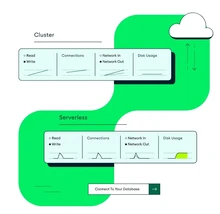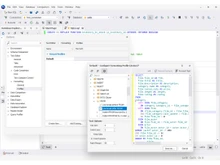MongoDB and PostgreSQL are both popular open-source NoSQL and SQL database management software, respectively. MongoDB is known for its flexibility and scalability, while PostgreSQL offers powerful data modeling and querying capabilities. MongoDB is ideal for handling large amounts of unstructured data, while PostgreSQL is better suited for complex transactions and adherence to SQL standards.
In this compare page, we will analyze the differences between MongoDB and PostgreSQL based on several parameters like features, performances, use cases, data relationships, scalability, and more.
MongoDB vs. PostgreSQL: An Overview
MongoDB is a well-known NoSQL DBMS (database management system) used for storing and managing large amounts of unstructured data. It is known for its scalability, high performance, and flexibility, making it a popular choice for big data and real-time web applications. MongoDB supports a wide range of data models, including JSON-like documents, recursive data, and sub-documents, allowing for flexible data modeling. Additionally, it provides rich query capabilities, including full-text search, geospatial queries, and aggregation.
PostgreSQL, on the other hand, is one of the mosr popular open-source RDBMS (relational database management systems) that is widely used for storing and managing structured data. It is famous for its reliability, data integrity, and ability to handle complex queries. PostgreSQL supports a variety of data types, has robust security features, and can handle large amounts of data with ease. It is also highly extensible, with a rich set of third-party libraries and tools.
MongoDB vs. PostgreSQL: Key Differences
Here are some key differences between MongoDB and PostgreSQL:
- MongoDB and other MongoDB alternatives use documents to obtain data, while PostgreSQL uses rows.
- Scaling is built-in for MongoDB, while PostgreSQL requires extensions for scalability.
- MongoDB uses collections to store data, while PostgreSQL uses tables.
- PostgreSQL and a few PostgreSQL alternatives excel in data warehousing and analysis workloads, while MongoDB performs well with long-term data storage.
- MongoDB uses redundant replica sets, while Postgres performs synchronous or 2-safe replication.
MongoDB vs. PostgreSQL: In Terms of Features
- Data Model: In MongoDB, a document-based data model is employed, wherein you can store data using JSON-similar documents that have dynamic schemas. It allows for the storage of various kinds of data within a single collection. On the other hand, PostgreSQL is an RDBMS that employs a relational model. It stores all the data in organized and structured tables and ensures data integrity through the process of normalization.
- Query Language: MongoDB utilizes its proprietary query language called MongoDB Query Language (MQL), which employs a JSON-similar syntax for executing queries. It also provides support for aggregation pipelines, enabling complex data manipulations. On the other hand, PostgreSQL utilizes SQL, a widely used language for data manipulation and querying. Apart from that, it excels in handling advanced indexing, analytical queries, and other operations.
- Flexibility in Schema: MongoDB provides extensive schema flexibility, allowing you to modify document structures without impacting other documents. Thus, it is well-suited for semi-structured as well as unstructured data. In contrast, PostgreSQL offers a rigid schema for databases with pre-defined table structures. Modifying the schema in PostgreSQL requires data migration to maintain consistency.
- ACID Properties and Transactions: MongoDB ensures ACID guarantees at the level of individual documents, meaning that transactions involving multiple documents are supported while maintaining data integrity and consistency. Conversely, PostgreSQL offers strong ACID compliance and supports transactions that consist of multiple tables, thereby ensuring robust data integrity and consistency.
- Data Types: PostgreSQL offers a wide range of data types including Boolean, Character, Numeric, etc. MongoDB supports data types like String, Numeric, Boolean, etc., with a larger BSON document size.
- Indexing: Both MongoDB and PostgreSQL support various types of indexes to improve query performance. MongoDB has a rich set of indexing options, including single field, compound, text, geospatial, and more. PostgreSQL also provides various index types but is particularly known for its strong support for advanced indexing techniques like B-tree, hash, and generalized inverted index (GIN) for full-text search.
MongoDB vs. PostgreSQL: Scalability
To manage enormous datasets and heavy traffic, document databases like MongoDB offer horizontal scaling through sharding. PostgreSQL is scalable via replication and clustering.
MongoDB vs. PostgreSQL: Performance
MongoDB is specifically designed to excel in low-latency, high-speed operations, which makes it an ideal choice for workloads that involve heavy reading. This document database permits the retrieval of entire documents in just one operation. On the other hand, PostgreSQL demonstrates excellent performance in analytical workloads. It employs sophisticated indexing techniques like hash, GiST, and B-tree indexes to optimize query execution. PostgreSQL is popular for both reading and writing operations.
The ACID compliance, extensibility, and data structure of PostgreSQL make it highly valuable for data-driven teams engaged in analytical querying and data warehousing. Moreover, it is applied in scientific research, healthcare and financial domains, online forums, and more. Furthermore, PostgreSQL has powered operations for popular platforms such as Foursquare, Twitch, and Instagram.
MongoDB vs. PostgreSQL: Data Relationships
In MongoDB, the relation between data can be modeled using embedded documents or references. On the contrary, the relation in PostgreSQL is mainly established using foreign keys, enforcing reference-based integrity between related tables.
MongoDB vs. PostgreSQL: Community and Ecosystem
Both MongoDB and PostgreSQL have strong open-source communities and a wide range of supporting tools and libraries. However, PostgreSQL has a larger user base, resulting in a robust ecosystem with abundant resources, extensions, and integration with other technologies.
MongoDB vs. PostgreSQL: Use Cases
MongoDB is employed in a variety of applications, including inventory management systems, CMS, IoT applications, analytics, and as a backend for gaming and mobile applications. Major global companies such as Vodafone, Toyota, Forbes, etc. have implemented MongoDB for their data management.
Verdict: MongoDB vs. PostgreSQL
After a thorough analysis, we can say that the major differences between MongoDB and PostgreSQL lie in terms of data models, scalability, data storage, and replication methods. MongoDB uses a document-oriented data structure and collections to store data, while PostgreSQL uses tables and rows.
MongoDB has built-in scaling for handling large datasets, while PostgreSQL requires extensions for scalability. MongoDB uses redundant replica sets, while PostgreSQL performs synchronous or 2-safe replication. Additionally, MongoDB is suitable for long-term data storage, while PostgreSQL excels in data warehousing and analysis workloads.


 5 Ratings & 0 Reviews
5 Ratings & 0 Reviews























